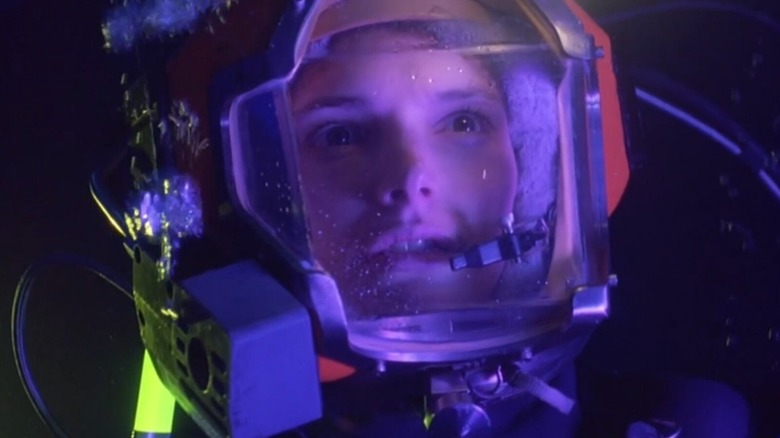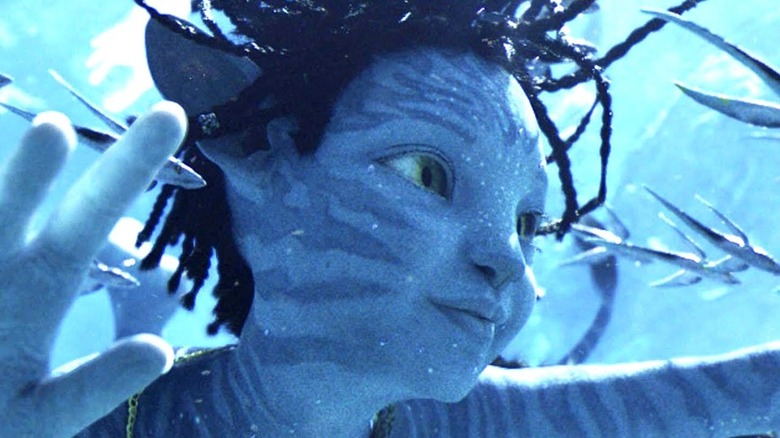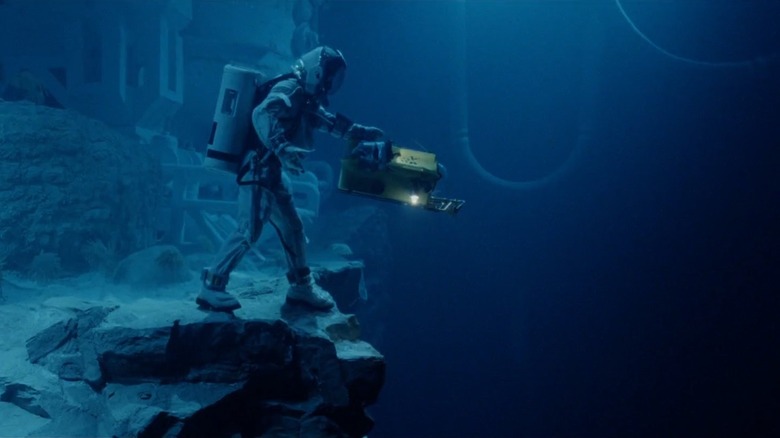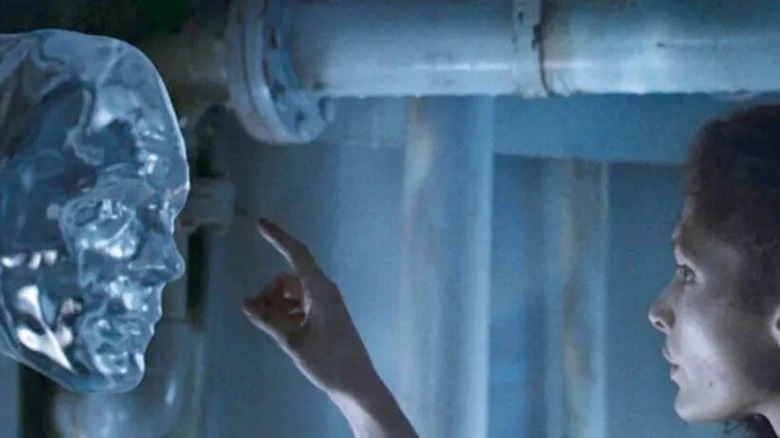Avatar: The Way Of Water Proves James Cameron Is Still Processing The Abyss
James Cameron's latest sure-to-be-massive-hit blockbuster, "Avatar: The Way of Water," is another remarkable achievement that will change the landscape of special effects for years to come. At the heart of it all, though, is a spirited adventure that celebrates the power of family while tapping into our collective climate anxieties.
"Avatar: The Way of Water" returns to Pandora and sees Jake Sully (Sam Worthington) and his family leave their forest for the ocean in an effort to escape the military forces that hunt them down. Anyone who's familiar with Cameron's work knows that the ocean has been a big part of his work for years, most famously in "Titanic," which stormed the Oscars and remains one of the highest-grossing films of all time.
Prior to "Titanic" and the "Avatar" franchise, however, Cameron unleashed "The Abyss." The aquatic sci-fi movie, released in 1989, tells the story of a group of scientists and soldiers who encounter an alien race at the bottom of the ocean while searching for a nuclear submarine. The movie barely broke even at the box office, but that hasn't deterred Cameron from resurrecting some of its themes and ideas in other projects. "Avatar: The Way of Water" repurposes concepts from "The Abyss" in interesting ways, and proves that Cameron is still processing his overlooked '80s sci-fi gem.
The Abyss and Avatar: The Way of Water are both wondrous explorations of the ocean
James Cameron has a long history in deep-sea exploration. An avid diver and submarine enthusiast, he broke records in 2012 by becoming the first person to reach the deepest corners of the Mariana Trench, according to National Geographic. Cameron has also helmed several documentaries about the ocean, but his fascination with it has informed his blockbusters for decades.
"The Abyss" is the product of Cameron's long-term love affair with the ocean. In interviews, he claimed that he wanted "The Abyss" to be the oceanic equivalent to "2001: A Space Odyssey," intended to evoke a sense of awe about the ocean in the same way Stanley Kubrick's classic did for outer space. That's not to say that the film isn't rife with dread and danger at times, but the director's love of the sea is tangible in every frame.
Similarly, "Avatar: The Way of Water" is a love letter to the ocean. The story spends a great deal of its three-and-half-hour runtime exploring an underwater world that's presented as splendorous and wondrous. Cameron recently told National Geographic that he hopes the film will inspire more people to care about the world's waters before they're destroyed beyond repair.
The Abyss and Avatar: The Way of Water required the actors to go underwater
The production troubles that dogged "The Abyss" have been well documented throughout the years. Filming underwater was a nightmare for the cast and crew, resulting in some reported near-death experiences for Cameron and Ed Harris (via Far Out). That said, the shoot was still an arduous task even when lives weren't at risk.
In short, the actors were lowered into a reactor containment vessel that could hold over 7.5 million gallons of water. Additional scenes were shot in a tank that held over 2.5 million gallons, so it's clear that Cameron and his crew required a lot of water to bring their vision for "The Abyss" to life. However, it was a groundbreaking movie for its time, and the negative moments didn't deter Cameron from going underwater again.
"Avatar: The Way of Water" also required the actors to swim around in large water tanks. According to Newsweek, they filmed the underwater scenes in a vessel that was 120 feet long, 60 feet wide, and 30 feet deep. The tank held 250,000 gallons of water, and it was constructed to allow the filmmakers to control the environment. The experience was more positive than the making of "The Abyss," but it was still a massive undertaking for those involved.
Aliens are the good guys in The Abyss and Avatar: The Way of Water
"The Abyss" is essentially James Cameron's "Close Encounters of the Third Kind." Like Steven Spielberg's classic, it presents an optimistic view of extraterrestrial life, and it isn't afraid to venture into soppy territory every once in a while.
Sci-fi films have a tendency to portray aliens as threats to humanity, but Cameron wants audiences to be open-minded when it comes to interacting with unknown life forms. The aquatic aliens in "The Abyss" possess destructive capabilities, for sure, but they'd rather communicate with humans than fight them at the end of the day. The aliens existed on Earth before humans arrived; they represent the natural world. The real threat is the military that's at odds with the planet and threatens to potentially annihilate it with nuclear weapons.
Cameron approached the "Avatar" movies with a similar point of view. Both films portray Pandora's native tribes as more enlightened and peaceful than human beings, who basically want to colonize everything. The Pandora people, meanwhile, are in touch with nature and only have to fight because people show up and start causing havoc.
James Cameron on the allegorical similarities between The Abyss and the Avatar movies
In a recent interview with Empire Magazine, James Cameron addressed the theory that suggests "Avatar" and "The Abyss" occur in the same universe. The director stated that while both movies take place in different worlds, there are some interesting thematic connections between them.
According to Cameron, "The Abyss" was his version of "The Day the Earth Stood Still" and a commentary on the "Cold War angst" he felt during the 1980s. He also described his 1989 sci-fi horror film as a comment on how "alien super-intelligence might judge rather harshly the way we mistreat each other and our beautiful world."
This notion also echoes throughout both "Avatar" movies, as humans are once again portrayed as lesser beings with destructive tendencies. "In Avatar, WE are the invaders from space, and the common theme with The Abyss is that we are judged harshly by a more evolved alien culture, in that case, the Na'vi, who live in a harmony with nature in a way that we have forgotten," he added.




